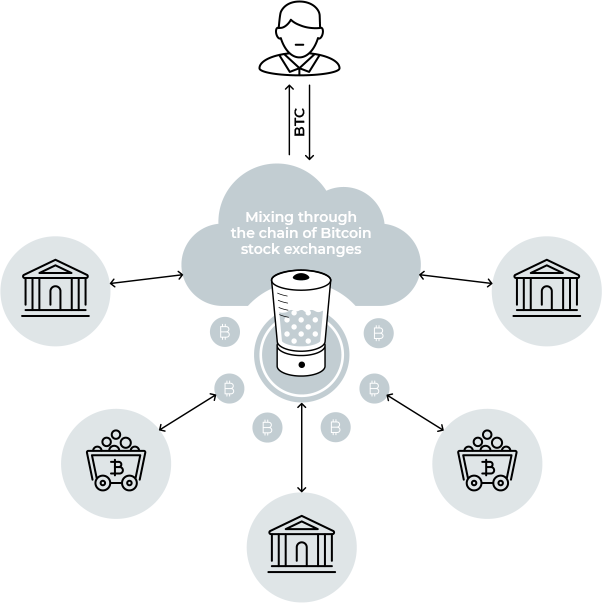How Does It Work?

Bitcoin is pseudo anonymous, all transactions are written in blockchain. Any person can obtain an access to the history of money transfers from one address to another one. Our service provides you with an opportunity to protect your anonymity.
We apply an innovative algorithm, Bitcoin Mixer 2.0, to uplevel anonymity and money mixing in comparison with classic mixers. The main advantage of our service is that all the funds returned to you after a mixing procedure are verified coins from cryptocurrency stock exchanges having an undoubtedly positive history.
An additional point is that you receive all your money in various parts at random time intervals and to the different addresses. It is probably the best anonymization algorithm as of today.
Benefits of Using Mixer
The algorithm: Bitcoin Mixer 2.0
We took the best of existing Bitcoin mixers, developed a new cryptocurrency anonymization algorithm, added an ability to receive a verified cryptocurrency from North American, European and Asian stock exchanges.
No registration, no logs
We do not store logs, all necessary information for transactions processing is deleted right after work completion and transaction confirmation or beyond the expiration of address lifetime for unexecuted requests.
We are available 24x7x365
Our algorithms are fully automated and our service operates around the clock. We provide our clients with ongoing support. In case of issues we are seeking to promptly address them.
Letters of guarantee
We provide digitally signed letters of guarantee which evidence a 100% obligation of our service to you. Please retain letters of guarantee. This gives an additional assurance to deal with any disputes that may arise.
FAQs
1. What is Bitcoin Mixer 2.0?
Bitcoin Mixer 2.0 applies an innovative algorithm, which is totally different from the approach of classic mixers. We replace your crypto coins with verified coins from European, Asian and North American Bitcoin stock exchanges. It significantly increases anonymization level and reduces a risk of getting cryptocoins of a doubtful character as in classic mixers.
2. Can I trust you with my money?
We offer a protection against accidental errors or deliberate actions to all our clients – all incoming orders are coupled with letters of guarantee signed with PGP keys.
3. How long does it take to cleanse Bitcoins?
The anonymization process takes up to 6 hours after receipt of the first confirmation on the incoming customer transaction. To prevent advanced time-based analysis of your blockchain transactions, we set a random time for Bitcoin return. As a result, a mixing time may vary from 1 up to 6 hours in order to increase anonymization level. Moreover, our clients receive cleansed money in various parts.
4. How many confirmations are required to accept a transfer?
We consider a transfer accepted upon receiving 1 confirmation.
5. What is a minimum amount of funds for cleansing?
0.001 BTC
6. What is a maximum amount of funds for cleansing?
50 BTC per one request. This limitation is forced, since a large volume per one transaction is easier to deanonymize using blockchain volume analysis method. The mixer allows to create several requests for cleansing.
7. What happens if I sent less money than required?
Smaller transactions will be regarded as a donation since it makes no business sense to conduct them and a commission of the Bitcoin network may be higher than that money. But if you have sent such sum by mistake, contact our help desk and we will suggest what might be done in your particular case.
8. How much does it cost?
A commission fee is dynamic and comes up to 3.5% + 0.0007 BTC which is a good offer for such anonymization level.
9. What kind of logs is stored in the system?
We do not store logs, all necessary information for transactions processing is deleted right after work completion and transaction confirmation or beyond the expiration of address lifetime for unexecuted requests. The only proof of our work is our letter of guarantee which you can keep.
10. What is a letter of guarantee?
When we provide you with a Bitcoin address, to which you may send your coins to be mixed, we provide a digitally signed confirmation that this address has truly been generated by our server. For your peace of mind we always provide you with such letter and sign it with a PGP signature. You may verify our digital sign using our public key. The Letter of Guarantee is the only proof of our obligations. Please always save the Letter of Guarantee before you send your coins to us.
11. How can I check a letter of guarantee?
To check a letter of guarantee, install a PGP client (for example, PGP4Win), import a public key from the website to the installed client and verify a letter of guarantee.
12. How long do addresses for coins transfer remain valid?
Addresses for coins transfer remain valid within 7 days since their creation. Such period was not chosen by accident. If any transactional issues of the network or errors on the sender’s side arise, such period is enough to address all emerging issues and delays, thus guaranteeing safeguard of assets of our end customers.
13. My browser had closed before I could get a confirmation for my transaction
No worries, everything is all right, the system operates in automatic mode, you will definitely receive your money. To monitor confirmations, you can use any Bitcoin block explorer, for example, blockchain.info. Enter there the information on addresses from a letter of guarantee and monitor transactions on your own.